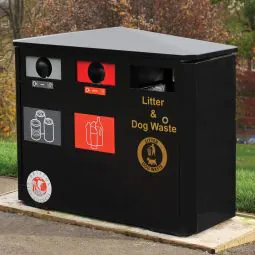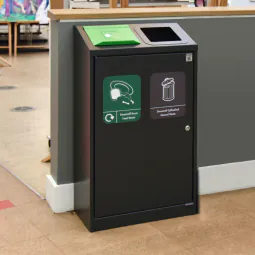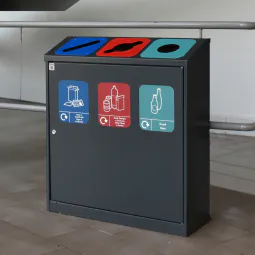Reduce food waste and support sustainability with Broxap’s range of durable and efficient food waste bins. As a leading UK manufacturer of street furniture, litter bins, recycling bins as well as food waste bins, we are committed to providing the toughest waste management and bin hub solutions across the UK, ensuring long-lasting performance. We work with various sectors, including education, businesses, architects, local authorities, parish councils, construction companies, and more, installing our flagship range of waste bins in every corner of the UK.
DEFRA (Department for Environment, Food & Rural Affairs) has launched a new simpler recycling scheme with the aim of making recycling more consistent across the country, making it easier for householders, businesses and coucnils to know what can and can’t be recycled, making recycling more effective.
With these changes in mind, now would be the right time to invest in reliable food waste recycling bins. A food waste caddy/bin for food waste helps reduce landfill waste and in the bigger picture, reduce the negative impact of pollution.
Order a food waste bin in the right size for your business. Our food waste bins range includes everything from compact small food waste bins to larger food waste green bins, with each bin built with food waste compartments to better dispose of items, odours, and contents harmful to the environment.
The unique designs of our waste management systems allow for certain compartments of the food waste to be converted for more flexible uses.
Food waste bin options
With various customisable options to choose from, recycling has never been made easier! Our space-saving food waste housing solutions are easy to maintain whilst helping to keep the streets clean, promoting cleaner and greener environments.
They are available in a range of standard RAL colours to seemingly blend in and improve the aesthetic of its location, whether internal or external.
Broxap food waste bins
Designed for durability, our food waste bins are built using weather-resistant materials making them suitable for daily use regardless of the weather conditions outdoors.
Having an innovative and yet hygienic design, our food waste recycling bins can eliminate unpleasant odours and assure easy disposal for businesses and public spaces. Additional features include self-locking doors, foot pedals, bait bases, advertising panels and more.
Food waste recycling is the process if collecting and repurposing food scraps to reduce landfill waste. From March 31st, 2025, all business or workplaces with ten employees or more must separate food waste from general waste and recyclable products. Local authorities need to follow suit by 31st March 2026. Many councils will offer food waste collection services to ensure it is disposed of correctly.
To start implementing food waste recycling, begin by assessing your current waste disposal practices. Educate employees on the importance of reducing food waste and set up clearly labelled bins for food waste waste, dry mixed recycling, paper and card, and general waste in accessible areas. Work with a local composting facility or service for proper waste disposal and regularly review and adjust the program for continuous improvement.
Recycling in the workplace can be simple with the right setup. Using a dedicated kitchen caddy or food waste bin helps to keep this tidy and makes it easier to separate scraps for collection. Choose one of our bins with a secure lid to help contain odours and use compostable liners for quick, mess-free disposal.
Keeping your outdoor food waste bins neat and secure is easy with proper bin housing/corral hubs or by using a food waste caddy. Using our dedicated and durable Food Waste Housing help to keep wheelie bins in place, prevent spills and reduce issues with pests or strong winds. Sturdy recycling and waste bins by Broxap also improve hygiene by keeping odours contained and making the area look tidier.
The Simpler Recycling scheme introduced by DEFRA not only aims to improve the recycling rate across the UK, but also supports the concept of a circular economy, meaning more products and materials are recycled and reused where possible, reducing the need for new materials. It also encourages local authorities and businesses to separate food waste and recyclable materials, such as newspapers, glass, metals, etc., from general waste, thereby easing the waste management process.
To effectively deal with the risk of contamination in recycling bins, workplaces and offices should use bins with clearly labelled lids specifically designed for food waste. This helps ensure that only appropriate materials are disposed of and minimises contamination. Providing detailed information and training for employees on what can and can't be recycled will promote better practices. This way, workplaces can can significantly contribute to sustainability efforts and reduce their environmental impact on the planet.
All types of food waste can go inside food waste bins, including but not limited to, tea bags, coffee grounds, dairy products, fish, meat, vegetables, compost, bread, fruit, cakes, pasta and pastries. Both raw and cooked food leftovers can go in a food waste bin, however packaging should be recycled separately.
You can minimise the risk of animals, pests or maggots from getting into food waste bins by always keeping a secure lid on them. Rinsing or washing out your food waste bin or caddy can also help by keeping it clean and free from food particles that attract mould, insects and pests.
Food waste can be collected weekly or bi-monthly. After collection, if the waste is not composted correctly, it can produce methane which is a greenhouse gas. Proper management and timely collection of garden waste help reduce methane emissions, promoting a healthier environment. Contact your local council to find out more.








